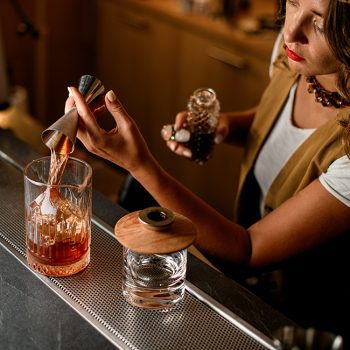Career roadblocks threaten the future of the on-trade
By Lauren BowesA survey by Celebrate Her into barriers to career progression in the hospitality industry has found that there are many hurdles to be overcome.

*This feature was first published in the August issue of The Spirits Business magazine.
As bartenders, how many of you have been asked if you’re a student? Questioned about what it is you really want to do? And how often have you caught yourself slipping into that kind of thinking on your own – wondering when you’ll ‘grow up and get a real job’?
The on-trade has often been considered a career stopgap, but according to a new survey by global community Celebrate Her, hospitality-training platform Allara Global, and consumer-intelligence experts CGA by NIQ, that perception is finally starting to shift.

“There was nothing really specific about the drinks industry – about the opportunities, the barriers, and important subjects like mental health and parenthood,” says Celebrate Her founder Anna Sebastian, on why she decided to conduct the survey. “We really wanted to be able to share the results and, ultimately, try to improve the hospitality industry all over the world.”
The survey polled 743 people aged over 18 on their views of the industry. All were either currently work in the on-trade or have worked in it in the previous six months.
Of those who had previously perceived the industry as a temporary role, 78% said their perception has shifted positively. That’s backed up by two-thirds of respondents who said they have built or are building lasting futures in the trade. “A lot of people are still seeing hospitality as a temporary job,” says Sebastian. “But once in the industry, employees shift to recognising its long-term potential. That’s a great opportunity to capitalise on.”
But despite this shift in mindset, the report paints a more complicated picture. While people are keen to stay in the industry, many aren’t sure they can.
Retention, safety, mental health, and career progression emerged as key pain points, alongside concerns around parental leave, discrimination, low pay and work-life balance. Despite the growing number of women entering hospitality, too many still face barriers that are hard to ignore – from late-night safety to structural bias in promotion.
The survey discovered that there is a ‘critical period’ where staff retention is particularly at risk. This tends to occur when an employee has been in a role for four to 10 years. Before this, employees are likely to be optimistic despite uncertainty. The report claims: “This is often where burnout peaks and employees recognise they haven’t been provided with adequate training and opportunities to progress, so they view their role as temporary.”
According to the survey, low pay, long hours, and lack of progression remain the most common reasons employees consider quitting. Nearly half (49%) of respondents say they’re not satisfied with their work-life balance. Mental and physical health are also major concerns: 57% say stress and burnout have hindered their career progression, and 85% drink alcohol weekly. Only 46% said they didn’t find managing their alcohol intake to be a challenge, with 32% finding it “a little challenging”, and a worrying 22% finding it “very challenging/challenging”.
Training and development also fall short. Among those considering leaving, 42% don’t feel they’ve had adequate training for their role, and even fewer have access to leadership development or clear pathways to progress. “Training should go beyond the basics,” said Sebastian. “They want to learn more than just how to make a drink – really focusing on leadership, management skills, what that career path could look like.”
One of the most pressing issues highlighted by the survey is personal safety – both on and off the job. Three in 10 employees have felt unsafe at work due to harassment or other threats, while 35% feel unsafe getting home late at night.
 Serious concern
Serious concern
Sexual harassment remains a serious concern, with female workers far more likely to experience it – and 27% of those affected didn’t report it. Among those who did speak up, 73% say their issue wasn’t resolved.
“This is a really interesting point to focus on,” says Sebastian. “Maybe this goes back to the training of management, and links back to the importance of having policies in place.”
One anonymous quote submitted to the survey reads: “I never was able to confide in management, and felt like they would laugh at me and take it as a joke when I would mention something. The management weren’t equipped for it.” The figures show this isn’t a one-off; 59% of those who chose not to report an issue said they did so because they “didn’t think I would be listened to/taken seriously”. Another 51% said they believed “nothing would change” after reporting, and a concerning 46% said they had a lack of trust in management.
More positively, 83% of respondents rated their workplace’s physical safety as good or excellent. In terms of safety policies in workplaces, 43% said they were aware of their emergency procedures, 40% reporting systems, and 37% risk assessments.
The contradiction suggests that while health-and-safety protocols may be in place, deeper issues of emotional safety, harassment, and trust in reporting systems remain unresolved.
The survey confirms what many already know: hospitality workers are struggling with their mental health, and the industry isn’t doing enough to support them.
While the majority of respondents agree mental health support is important, only 40% think there’s enough support available in their workplace. Four in 10 say they wouldn’t feel comfortable raising mental health concerns at work, and 45% believe their concerns wouldn’t be taken seriously if they did – a figure that was 11 percentage points higher for front-of-house roles.
Hospitality has always benefitted from diverse perspectives, and 82% of respondents agreed diversity is important in their workplace. But representation gaps persist. Respondents believed gender and age are well represented, but those with disabilities, religious beliefs, or minority sexual orientations remain underrepresented in many venues. And 42% felt that people with disabilities weren’t represented at all.

A mixed picture
When it comes to fairness, the picture is mixed. Two-thirds of employees believe there are fair opportunities for all employees, and 65% feel supported by management. But male employees are significantly more likely to report positive experiences with equality and opportunity – while three in 10 women say they’ve been held back by discrimination or bias.
Perhaps the starkest divide in the survey is between employees with and without caregiving responsibilities. A majority 76% of parents say they’ve had to turn down work opportunities because of family commitments – from events and competitions to travel and bar shows. “Employees with children report loss of opportunities due to family commitments,” says Sebastian. “We’ve had verbal and written feedback, especially from people who identify as women, who felt suddenly after having a child, they felt isolated and lonely, and didn’t have the same opportunities.”
Though 70% know where to find information about their company’s parental leave policies, that knowledge hasn’t translated into accessible opportunities. For many, the trade-off between career and care remains too steep. Meanwhile, the barriers to career progression – especially for those with four to 10 years’ experience – are holding back the industry. Of those surveyed, 57% say promotion criteria are unclear, 51% cite unconscious bias, and almost half feel that senior roles are simply too few and far between. “If we can change perceptions, can we change the pay, can we change career advancement, and all of these things as well?” asks Sebastian.
The teams behind the survey are already thinking about the next steps, and have created a four-step action plan for change (see below).
One issue already in the spotlight is gender imbalance in guest-shift line-ups. “In your 50 Best-type bars, around 85%-90% of guest shifts are all male,” says Sebastian. “One idea we’re exploring is an open letter to get brands to commit to at least 30%-50% women on line-ups.”
In the long run, Sebastian hopes this research won’t just be a report, but a catalyst for tangible industry change. “We want to create an ecosystem where it doesn’t just stop with the report. We can use this to do good, and leave the industry better than a year ago.”
After all, she adds: “The longer people spend in the industry, the more opportunities they see – and the more they see this as a serious industry.”
Actions for the industry
The survey identified clear, actionable changes that could dramatically improve working conditions, increase retention, and elevate hospitality’s public image.
- Improve industry image: There’s a need to proactively improve the industry’s reputation to attract committed, career-minded employees from the outset.
- Promote retention drivers: Normalise competitive pay, clear progression paths, work-life balance, and access to training to boost job satisfaction and longevity in the field.
- Address missed opportunities: Competitions are a valued motivator, but many employees miss out simply because of a lack of access, an easily addressable gap for employers.
- Celebrate internal success stories: Highlight employee journeys from entry-level to leadership to shift perceptions and inspire ambition.
Related news
Scottish on-trade nets 40% business rates relief
Are Indian investors waking up to the power of the on-trade?
